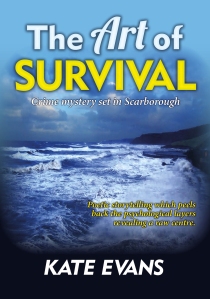You want to write a (crime) novel? But don’t know where to start? Let me suggest two concepts: to write a novel, you have to start writing; and to write a novel, you have to have some kind of routine.
If you’re serious about writing a novel don’t wait until (a) you’ve retired; or (b) your garden is tidy; or (c) you’ve learned cordon bleu cookery. If you’re serious about writing a novel, then you have to be serious about your writing, giving it the physical and psychological time, space and permission it deserves. Which does mean, in my experience, letting other things go.
I take as my inspiration, the grand dame of crime writing, PD James: ‘Learn to write by doing it. Read widely and wisely. Increase your word power. Find your own individual voice through practising constantly.’ (Quoted in 2016 Mslexia diary, www.mslexia.co.uk.)
Don’t wait for inspiration to strike. If you start writing, inspiration will come. These days I am lucky to work part-time, so I can write at my preferred time of the day, the morning. But all through my 20s and 30s I wrote while still doing a full-time job. I commuted into London, worked, commuted back again, snatched dinner and then sat down to write for two hours. I wrote at weekends. I produced a plethora of non-fiction articles, short stories and four novels. I know I could not have done this without routine.
Whatever schedule you decide for your writing, make sure you tell yourself it through noting it down in a diary or on a programme. And make sure those around you are aware of it and ask them to support you to stick to it.
A writer notices. A writer notices and listens. A writers notices, listens and then writes. Get used to noticing and listening. An exercise which is great for expanding a writer’s capacity for noticing encourages the use of all the physical senses. We have five physical senses: sight; hearing; taste; smell; touch. We also have how we feel emotionally, which will express itself through our bodies.
We will have a physical sense which we tend to be most comfortable with. If I ask you to describe a tractor, some of you may come up with a sound or a colour or a smell or a texture or even maybe a taste (taste and smell are linked, so I can taste diesel when imagining a tractor). What’s the sense you tend least towards, the one you find hardest to put descriptive words to? For the next two weeks you are going to become obsessed with that sense.
For the first week, you are going to consciously ask yourself to utilise this sense as you are out and about. Then at least three times a day you are going to sit down and write for twenty minutes about what you have noticed, including whether you’ve had any emotional responses, describing how they manifested themselves in your body. If you can, take short mindful walks (see blog post: http://goo.gl/88bMMY) and then write for ten minutes about everything you noticed around you and within your body.
For the second week, either imagine what it might be like to lack this particular sense or to have it enhanced. Again do the short bursts of writing during the day.
I prefer to do this kind of writing long-hand with pen and paper and I have a writing journal for this purpose. I think the connection between hand, pen and paper, brings forth notions which are hidden behind what we think we ought to be writing. One student of mine described it as ploughing a field, turning over the top-soil and finding what is underneath the ‘now of the mind’. However, it may also be possible to do this writing on a digital device. Try to write quickly and try not to worry about ‘getting it right’, attempt not to censor yourself.
These exercises are like the warm-ups in the gym. Something may come out of them which you  want to use in writing you share with an audience. But you can make a choice about that later, for now they are purely for your own enjoyment and to practise and develop your writing skills.
want to use in writing you share with an audience. But you can make a choice about that later, for now they are purely for your own enjoyment and to practise and develop your writing skills.
Next time I will explore how to start finding the characters who will tell our story.
The first in my crime series set in Scarborough, The Art of the Imperfect and The Art of Survival are available on Amazon on Kindle and in paperback (click on their titles to be connected).
AND if you’re an indie author come and join our International Indie Book Tour: http://katemcolby.com/2016/01/25/last-day-to-join-the-2016-2k-indie-book-tour/

Pingback: Writing the boring: How to write transitional material between novel chapters | Write on the World
Reblogged this on The intangible world of the literary mind.
LikeLike
Thanks for the reblog!
LikeLiked by 1 person
You are welcome
LikeLike